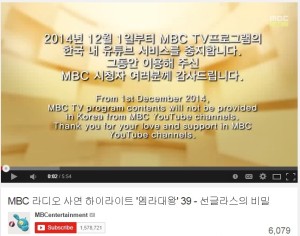 Not long ago, we talked about how international fans have to suffer from “unceasing discrimination” from YouTube uploaders in Korea, in which many official channels block online content for IP addresses that appear to be from outside of the country. However, the situation is now completely reversed, as seven major television broadcasters in Korea, including MBC, SBS, JTBC, tvN, and Mnet, have decided to disallow their contents to be accessible to Korean YouTube users from this December.
Not long ago, we talked about how international fans have to suffer from “unceasing discrimination” from YouTube uploaders in Korea, in which many official channels block online content for IP addresses that appear to be from outside of the country. However, the situation is now completely reversed, as seven major television broadcasters in Korea, including MBC, SBS, JTBC, tvN, and Mnet, have decided to disallow their contents to be accessible to Korean YouTube users from this December.
For international fans: no need to panic! IPs from outside of Korea will be able to continue watching K-pop and K-drama on YouTube as usual. This time, only the domestic users have to bear the brunt.
This decision is the unhappy outcome for a series of failed negotiations between the Korean channels and the giant Google. From the content providers’ perspective, their original deal with Google — in which broadcasters receive only 55% of profits from advertisements attached to their videos — is unacceptably unfair. Therefore, earlier in 2013, these seven broadcasters have united under an alliance called Smart Media Representative to strengthen their voice in demanding from Google a larger share of profit.

Despite all that, Google do not back down. They claim that this practice of 55% has been the tradition Google applies for every country, and express their wish to continue as a platform for Korean culture and contents. This time, though, perhaps Google should not have relied too much on their brand power in this debate.
Unlike many other countries where YouTube is the number one (and pretty much only) internet platform for video sharing, finding, and watching, Koreans people enjoy other popular alternatives such as Naver or Daum. Plus, Naver and Daum offer these Smart Representative broadcasters 90% of the money from advertisements. There is no need to guess who would win the deal.
So how do netizens respond to this change when there is no more readily available (and free) music, variety shows, dramas, anything? In this tug-of-war between content creators and online platforms, domestic users are surely the one who are hurt. Apparently netizens are quite fed up with this outcome. However, for the time being, besides switching to a foreign IP or using Naver, it seems like K-fans cannot do much about this situation yet.
[Source: Joongang Daily, The Korea Herald, Kookmin Ilbo. Images via The Korea Herald, YouTube [1] [2])

